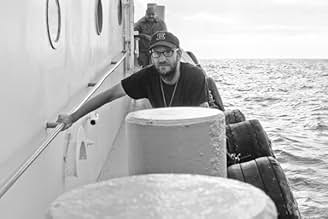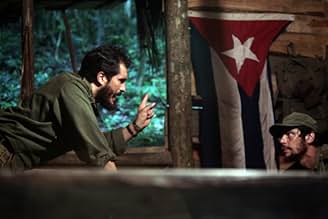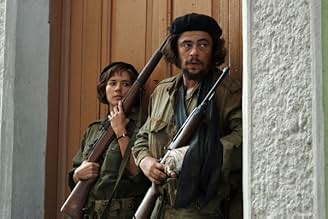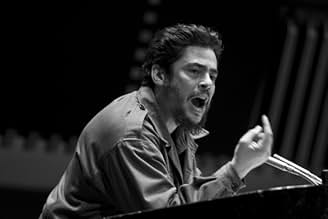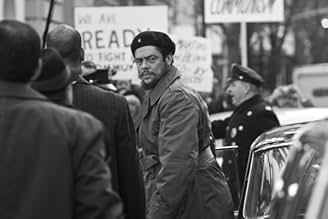In 1956, Ernesto 'Che' Guevara and a band of Castro-led Cuban exiles mobilize an army to topple the regime of dictator Fulgencio Batista.In 1956, Ernesto 'Che' Guevara and a band of Castro-led Cuban exiles mobilize an army to topple the regime of dictator Fulgencio Batista.In 1956, Ernesto 'Che' Guevara and a band of Castro-led Cuban exiles mobilize an army to topple the regime of dictator Fulgencio Batista.
- Director
- Writers
- Stars
- Awards
- 4 wins & 13 nominations total
Oscar Isaac
- Interpreter
- (as Óscar Isaac)
María Isabel Díaz Lago
- María Antonia
- (as María Isabel Díaz)
Demián Bichir
- Fidel Castro
- (as Demian Bichir)
Ramon Fernandez
- Héctor
- (as Ramón Fernández)
Yul Vazquez
- Alejandro Ramírez
- (as Yul Vázquez)
Jsu Garcia
- Jorge Sotús
- (as Jsu García)
Luis Alfredo Rodríguez Sánchez
- Rebel Messenger #1
- (as Luis Rodríguez Sánchez)
Roberto Santana
- Juan Almeida
- (as Roberto Luis Santana)
- Director
- Writers
- All cast & crew
- Production, box office & more at IMDbPro
Featured reviews
Che: Part One felt very complete and fulfilling. I found myself looking at Ernesto "Che" Guevara as a very well rounded person. Not as an ideological self fulfilling man but as an articulate man with thought out rational decisions as well as a man with many useful talents.
The acting of the cast all around was very good but Benicio Del Toro took the movie by storm but he did this in a very subtle way. His performance displayed how Che's spirit was able to superseded the hardships faced in the Cuban Revolution. It did not display any brutality or recklessness but a devotion to a cause. Del Toro's perforations was that worthy of an Oscar nomination but I don't think Che Guervara cared to much about awards.
The directing by Steven Soderbergh was visually stunning at times with much of the scenes shot in the forest. What kept the movie upbeat though were the scenes of Che in New York giving interviews and addressing the U.N. It added an extra layer to the film allowing you to see another side of Che. The side in which he shows his political and speaking abilities. The writing was very good with the dialog always keeping you engrossed. The music, though not much of it, was very good and stayed within rhythm of the rest of the film.
Overall the film succeeds in showing Che as a well rounded man never developing into oversimplified or unnecessarily complex portrayal of a man. The movie was very accurate and refused to take on a role of being inspiring or Hollywoodish which I enjoyed. The only problem with the film I had was that it seems to have a little too much of a feel of a war film rather than a biopic. Still I highly recommend this film.
The acting of the cast all around was very good but Benicio Del Toro took the movie by storm but he did this in a very subtle way. His performance displayed how Che's spirit was able to superseded the hardships faced in the Cuban Revolution. It did not display any brutality or recklessness but a devotion to a cause. Del Toro's perforations was that worthy of an Oscar nomination but I don't think Che Guervara cared to much about awards.
The directing by Steven Soderbergh was visually stunning at times with much of the scenes shot in the forest. What kept the movie upbeat though were the scenes of Che in New York giving interviews and addressing the U.N. It added an extra layer to the film allowing you to see another side of Che. The side in which he shows his political and speaking abilities. The writing was very good with the dialog always keeping you engrossed. The music, though not much of it, was very good and stayed within rhythm of the rest of the film.
Overall the film succeeds in showing Che as a well rounded man never developing into oversimplified or unnecessarily complex portrayal of a man. The movie was very accurate and refused to take on a role of being inspiring or Hollywoodish which I enjoyed. The only problem with the film I had was that it seems to have a little too much of a feel of a war film rather than a biopic. Still I highly recommend this film.
Che Part One is an interesting and enjoyable film about the Cuban revolution, that focuses on the infamous Ernesto 'Che' Guevara. The story follows Che from his first meeting with Castro, to the climactic battle in Santa Clara, where Batista's army makes its last stand against the revolutionaries.
This battle scene is filmed guerrilla warfare style in an urban environment, with short bursts of action followed by silence as soldiers move into newer/better positions. It all feels very tense and realistic, which makes a nice change to the shaky cam explosion fests that we're used to. This style works well throughout the rest of the film but swaps the city for the jungle.
The flash forward scenes where Che is interviewed and later addresses the United Nations, help to give the story, and Che, more depth and background, whilst giving us insights into his personality and ideology. Along with the battles, these scenes also help to break up the slower parts of the film.
Cinematography in the film is good and occasionally great, with some stunning shots of the Cuban landscape. The black and white scenes are also well shot, without feeling out of place.
On another positive note, Benicio Del Toro does an excellent job portraying Che. He is understated and believable as the man who wanted to change people's lives, focused on doing what he thought was right.
Unfortunately though, I had trouble caring about or even remembering most of the other characters, as dialogue between them isn't particular memorable. Sometimes you almost feel like you're watching a documentary that's trying to teach rather than entertain and this can start to wear, especially when you're reading subtitles. Che may also be shown in a better light than some would like, although honestly I feel the film is fairly accurate in its portrayal of the man and the history.
I'd definitely recommend this film to anyone interested in Che or the events in Cuba. Even if at times things do get a little slow, it's still a rewarding and informative experience.
This battle scene is filmed guerrilla warfare style in an urban environment, with short bursts of action followed by silence as soldiers move into newer/better positions. It all feels very tense and realistic, which makes a nice change to the shaky cam explosion fests that we're used to. This style works well throughout the rest of the film but swaps the city for the jungle.
The flash forward scenes where Che is interviewed and later addresses the United Nations, help to give the story, and Che, more depth and background, whilst giving us insights into his personality and ideology. Along with the battles, these scenes also help to break up the slower parts of the film.
Cinematography in the film is good and occasionally great, with some stunning shots of the Cuban landscape. The black and white scenes are also well shot, without feeling out of place.
On another positive note, Benicio Del Toro does an excellent job portraying Che. He is understated and believable as the man who wanted to change people's lives, focused on doing what he thought was right.
Unfortunately though, I had trouble caring about or even remembering most of the other characters, as dialogue between them isn't particular memorable. Sometimes you almost feel like you're watching a documentary that's trying to teach rather than entertain and this can start to wear, especially when you're reading subtitles. Che may also be shown in a better light than some would like, although honestly I feel the film is fairly accurate in its portrayal of the man and the history.
I'd definitely recommend this film to anyone interested in Che or the events in Cuba. Even if at times things do get a little slow, it's still a rewarding and informative experience.
This struck me as a documentary or, more fairly as a personal yet direct meditation on the own words of a man, embedded in context, which may also be a definition for documentary I was deeply impressed by the honesty of this film. I understood where Soderbergh, the artist, was, as i felt the space he left for me to think. How he uses Che's own expression of the part of his life depicted in the film, with the least possible manipulation (editing the book is already manipulating) and still, it's up to the viewer to place his own opinions over what he saw - more or less distanced according to where we come from and where and how long we lived. Of course this is made considering that who goes to the film has a previous knowledge of what context and moment, and what character he is about to watch.
I'll put this film together with Medem's 'La pelota vasca' (an assumed documentary) for they both show an extreme sensitivity working with such delicate themes as like they choose to work. Both originated some contesting, More with Medem's because the director was more rooted in the problem that was shown, and because the story is far from being closed, but to me they were both opened films which, as any contemporary film should be, leave a lot of the thinking to the public, and work as brain starter for discussion.
The narrative structure is effective, the artwork and editing are of great competence. Che in the woods of Sierra Maestra, on the verge taking the power in Cuba inter cut with his visit to the USA, in 1964. This second line is shot in black and white, the other has beautiful colors. The absence of music was a mildly risky choice i appreciated. The rest, you can think of it yourself. I thought Del Toro was very good, internally concentrated, resisted totally to being what we expected Che to be, and that's something, to be able to interpret a character with such an charismatic aura behind him, which we can still feel when his own words are spoken. From this film on, i admire Del Toro; before this i didn't look at him as i do now. I'll review his previews performances, i have to check if i didn't notice how good he is. Quite on the contrary, Bichir, as Fidel, was a total disaster, frankly one of the worst performances i've ever seen. How could he think Fidel was all about imitating a voice, some gestures, and handling a cigar. What a mess.
Of course this man's story is controversial, which means one can make radically opposed opinions out of the same known and accepted facts. The fair amount of arguments i've had since i saw it with someone who saw it with me prove me right here. I think Guevara was a lucid man, who read perfectly well the mechanics of the world of oppression where he stood. He chose to stand there and live like them, though he wasn't like them, and that's worth admiration. The ideas he made of the injustice he saw was a product of a genuine mind. But though the diagnosis was right, the whole process of making it in practical terms was a mess, to my eyes. He was at the root of a regime, inserted in a bigger regime, that grew on arrogance, on hypocrisies, and at a certain point became at least so unfair to the same oppressed people as those oppressed had before. And that's because, though wanting to do different, this revolution used the same weapons of strenght and physical superiority others had used. And that killed the whole idea. And Guevara was there, with it, being oppressive when he thought he was being better, out of, i think, ingenuity. What i say is, read the man, his observations are probably equally (or even more) correct today as they were when he made them, but don't follow his steps, i wouldn't, not knowing what i know today.
Also, notice how Che, the icon, grew to incredible proportions, 3 reasons i give it:
-He died young, and fighting for ideals, at least shooting for ideas;
-He was picked up by the very capitalism he rejected and was sold like an icon the population (mainly youth) desperate to get out of the contradictions in this regime, check the contradiction of this;
-He had an image standing for him, literally an image, the photograph Korda took. It's amazing, and it's probably an unique case, how a single image can move millions, how the right moment, with the right publicity can be so powerful. If you think about that, among the capitalists who sell tshirts and the liberals who believe Guevara, this is image is the center of the most successful publicity campaign ever. Once more, i admire Soderbergh's intelligence to leave that image out of this film. It's more than avoiding a cliché. It's avoiding the viewers to go recall clichés they've made (me included) over that image.
My opinion: 4/5
http://www.7eyes.wordpress.com
I'll put this film together with Medem's 'La pelota vasca' (an assumed documentary) for they both show an extreme sensitivity working with such delicate themes as like they choose to work. Both originated some contesting, More with Medem's because the director was more rooted in the problem that was shown, and because the story is far from being closed, but to me they were both opened films which, as any contemporary film should be, leave a lot of the thinking to the public, and work as brain starter for discussion.
The narrative structure is effective, the artwork and editing are of great competence. Che in the woods of Sierra Maestra, on the verge taking the power in Cuba inter cut with his visit to the USA, in 1964. This second line is shot in black and white, the other has beautiful colors. The absence of music was a mildly risky choice i appreciated. The rest, you can think of it yourself. I thought Del Toro was very good, internally concentrated, resisted totally to being what we expected Che to be, and that's something, to be able to interpret a character with such an charismatic aura behind him, which we can still feel when his own words are spoken. From this film on, i admire Del Toro; before this i didn't look at him as i do now. I'll review his previews performances, i have to check if i didn't notice how good he is. Quite on the contrary, Bichir, as Fidel, was a total disaster, frankly one of the worst performances i've ever seen. How could he think Fidel was all about imitating a voice, some gestures, and handling a cigar. What a mess.
Of course this man's story is controversial, which means one can make radically opposed opinions out of the same known and accepted facts. The fair amount of arguments i've had since i saw it with someone who saw it with me prove me right here. I think Guevara was a lucid man, who read perfectly well the mechanics of the world of oppression where he stood. He chose to stand there and live like them, though he wasn't like them, and that's worth admiration. The ideas he made of the injustice he saw was a product of a genuine mind. But though the diagnosis was right, the whole process of making it in practical terms was a mess, to my eyes. He was at the root of a regime, inserted in a bigger regime, that grew on arrogance, on hypocrisies, and at a certain point became at least so unfair to the same oppressed people as those oppressed had before. And that's because, though wanting to do different, this revolution used the same weapons of strenght and physical superiority others had used. And that killed the whole idea. And Guevara was there, with it, being oppressive when he thought he was being better, out of, i think, ingenuity. What i say is, read the man, his observations are probably equally (or even more) correct today as they were when he made them, but don't follow his steps, i wouldn't, not knowing what i know today.
Also, notice how Che, the icon, grew to incredible proportions, 3 reasons i give it:
-He died young, and fighting for ideals, at least shooting for ideas;
-He was picked up by the very capitalism he rejected and was sold like an icon the population (mainly youth) desperate to get out of the contradictions in this regime, check the contradiction of this;
-He had an image standing for him, literally an image, the photograph Korda took. It's amazing, and it's probably an unique case, how a single image can move millions, how the right moment, with the right publicity can be so powerful. If you think about that, among the capitalists who sell tshirts and the liberals who believe Guevara, this is image is the center of the most successful publicity campaign ever. Once more, i admire Soderbergh's intelligence to leave that image out of this film. It's more than avoiding a cliché. It's avoiding the viewers to go recall clichés they've made (me included) over that image.
My opinion: 4/5
http://www.7eyes.wordpress.com
Nothing quite like getting your teeth into an epic is there? Sitting back and letting yourself get immersed into a struggle, a journey, in this case the Cuban revolution that has become such a cause celebre for many since the 1950s. By the time I left the cinema I sadly felt as though the epic had been squashed down into an easily swallowed period piece with all the epic grandeur of a Dan Brown novel. The problem with Che Part One is that it doesn't say anything particularly interesting or contain any memorable moments. There is lots and lots of shooting which is actually fairly sanitised (this is certainly no Saving Private Ryan), there is some mistreatment of people who are then avenged and there are lots of shots of Benicio del Toro looking quite idealistic and cool.
Don't get me wrong, there is nothing specifically wrong with this film. It portrays a fairly accurate (if, as I said, sanitised) picture of the March on Santa Clara and the victory of Castro's rebels. However much in the same way as the kind of perpetually running museum film that you can dip in and out of it is largely uninspiring and leaves you feeling quite detached. The problem is not the direction or the acting which does manage to transport you into the heart of a Civil War ravaged Cuba. It is the fact that we learn next to nothing about Cuba, Che himself or the goals of the revolutionaries. We learn nothing of why the Batista regime was so bad that people wanted to overthrow it. Which means that this simply stands alone as a war film where there are lots of explosions, lots of running around and some scenes of people celebrating in the streets. While I understand from reports that Che Part Two is rather different I think that nevertheless the slight blandness of Che Part One means that, though it looks good, it does feel like a rather wasted opportunity.
Don't get me wrong, there is nothing specifically wrong with this film. It portrays a fairly accurate (if, as I said, sanitised) picture of the March on Santa Clara and the victory of Castro's rebels. However much in the same way as the kind of perpetually running museum film that you can dip in and out of it is largely uninspiring and leaves you feeling quite detached. The problem is not the direction or the acting which does manage to transport you into the heart of a Civil War ravaged Cuba. It is the fact that we learn next to nothing about Cuba, Che himself or the goals of the revolutionaries. We learn nothing of why the Batista regime was so bad that people wanted to overthrow it. Which means that this simply stands alone as a war film where there are lots of explosions, lots of running around and some scenes of people celebrating in the streets. While I understand from reports that Che Part Two is rather different I think that nevertheless the slight blandness of Che Part One means that, though it looks good, it does feel like a rather wasted opportunity.
It helps to know that this was originally brought to life as a Terrence Malick screenplay about Che's disastrous forray in Bolivia. Financing fell through and Soderbergh stepped in to direct. He conceived a first part and shot both back to back as one film trailing Che's rise and fall.
He retained however what I believe would be Malick's approach: no politics and a just visual poem about the man behind the image, exhaustive as the horrible slog through Cuban jungles and windswept Andean plateaus must have been. Malick applied this to his New World that he abandoned Che for, lyrical many times over.
But Soderbergh being an ambitious filmmaker, he puzzled over this a little more. Here was a man of action at the center of many narratives about him, some fashioned by himself, conflictingly reported as iconic revolutionary or terrorist, charismatic leader or ruthless thug, erudite Marxist thinker or brutal soldier.
So how to visually exemplify this contradicting ethos as our film about him? And how to arrange a world around this person in such a way as to absorb him whole, unfettered from narrative - but writing it as he goes along - off camera - but ironically on - and as part of that world where narratives are devised to explain him. As flesh and bones, opposed to a cutout from a history book.
One way to do this, would be via Brecht and artifice. The Korda photograph would reveal lots, how we know people from images, how we build narratives from them. Eisenstein sought the same in a deeper way, coming up with what he termed the 'dialectical montage': a world assembled by the eye, and in such ways as the eye aspires to create it.
So what Soderbergh does, is everything by halves: a dialectic between two films trailing opposite sides of struggle, glory and failure, optimism and despair. Two visual palettes, two points of view in the first film, one in the presence of cameras hoping to capture the real person, the other were that image was being forged in action.
The problem, is of course that Brecht and Eisenstein made art in the hope to change the world, to awaken consciousness, Marxist art with its trappings. By now we have grown disillusioned with the idea, and Soderbergh makes no case and addresses no present struggles.
But we still have the cinematic essay about all this.
The first part: a narrative broadcast from real life, meant to reveal purpose, ends, revolution. The second part: we get to note in passing a life that is infinitely more expansive than any story would explain, more complex, beautiful, frustrating, and devoid of any apparent purpose other than what we choose as our struggle, truly a guerilla life.
I imagine a tremendous film from these notions. Just notice the remarkable way Part 2 opens. Che arrives at Bolivia in disguise, having shed self and popular image. No longer minister, spokesman, diplomat, guerilla, he is an ordinary man lying on a hotel bed, one among many tourists. Life could be anything once more, holds endless possibility. Cessation.
What does he do? He begins to fashion the same narrative as before, revolution again. Chimera this time. Transient life foils him in Bolivia. Instead of changing the world once more, he leaves behind a story of dying for it. We have a story about it as our film, adding to the rest.
He retained however what I believe would be Malick's approach: no politics and a just visual poem about the man behind the image, exhaustive as the horrible slog through Cuban jungles and windswept Andean plateaus must have been. Malick applied this to his New World that he abandoned Che for, lyrical many times over.
But Soderbergh being an ambitious filmmaker, he puzzled over this a little more. Here was a man of action at the center of many narratives about him, some fashioned by himself, conflictingly reported as iconic revolutionary or terrorist, charismatic leader or ruthless thug, erudite Marxist thinker or brutal soldier.
So how to visually exemplify this contradicting ethos as our film about him? And how to arrange a world around this person in such a way as to absorb him whole, unfettered from narrative - but writing it as he goes along - off camera - but ironically on - and as part of that world where narratives are devised to explain him. As flesh and bones, opposed to a cutout from a history book.
One way to do this, would be via Brecht and artifice. The Korda photograph would reveal lots, how we know people from images, how we build narratives from them. Eisenstein sought the same in a deeper way, coming up with what he termed the 'dialectical montage': a world assembled by the eye, and in such ways as the eye aspires to create it.
So what Soderbergh does, is everything by halves: a dialectic between two films trailing opposite sides of struggle, glory and failure, optimism and despair. Two visual palettes, two points of view in the first film, one in the presence of cameras hoping to capture the real person, the other were that image was being forged in action.
The problem, is of course that Brecht and Eisenstein made art in the hope to change the world, to awaken consciousness, Marxist art with its trappings. By now we have grown disillusioned with the idea, and Soderbergh makes no case and addresses no present struggles.
But we still have the cinematic essay about all this.
The first part: a narrative broadcast from real life, meant to reveal purpose, ends, revolution. The second part: we get to note in passing a life that is infinitely more expansive than any story would explain, more complex, beautiful, frustrating, and devoid of any apparent purpose other than what we choose as our struggle, truly a guerilla life.
I imagine a tremendous film from these notions. Just notice the remarkable way Part 2 opens. Che arrives at Bolivia in disguise, having shed self and popular image. No longer minister, spokesman, diplomat, guerilla, he is an ordinary man lying on a hotel bed, one among many tourists. Life could be anything once more, holds endless possibility. Cessation.
What does he do? He begins to fashion the same narrative as before, revolution again. Chimera this time. Transient life foils him in Bolivia. Instead of changing the world once more, he leaves behind a story of dying for it. We have a story about it as our film, adding to the rest.
Did you know
- TriviaFor his role, Benicio Del Toro spent seven years researching Guevara's life.
- GoofsWhen the guerrilleros are in the Sierra Maestra, we can hear the coqui (Eleutherodactylus coqui) singing in the night. However, this small frog is endemic to Puerto Rico and the Virgin Islands, thus not possible to be heard in Cuba.
- Quotes
Lisa Howard: What is the most important quality for a revolutionary to possess?
Ernesto Che Guevara: El amor.
Cuban Diplomat #1: [translating] Love.
Lisa Howard: Love?
Cuban Diplomat #1: Love of humanity... of justice and truth. A real revolutionary goes where he is needed.
- ConnectionsFeatured in Así se hizo - Che El Argentino (2008)
- SoundtracksBasura
Written and Performed by Mark A. Mangini (as Mark Mangini)
Details
Box office
- Budget
- $35,000,000 (estimated)
- Gross US & Canada
- $748,555
- Opening weekend US & Canada
- $61,070
- Dec 14, 2008
- Gross worldwide
- $34,209,066
- Runtime2 hours 14 minutes
- Color
- Sound mix
- Aspect ratio
- 2.39 : 1
Contribute to this page
Suggest an edit or add missing content

